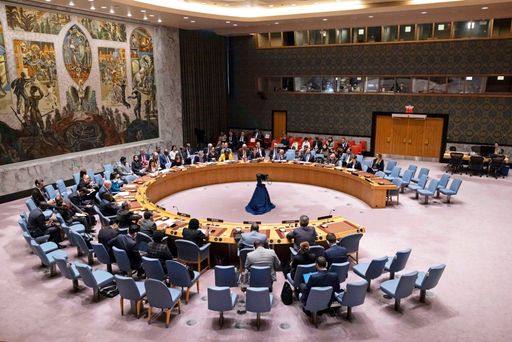Last September, during the high-level week of the 79th United Nations General Assembly, I interviewed the UN Secretary-General’s spokesperson, Stephane Dujarric, while walking through the Rose Garden at the UN headquarters in New York.
Inside the UN building, speeches were being delivered on the topics of peace, multilateralism, and shared responsibility. Outside, the mood was very different: a few blocks away, protestors lined the sidewalks, traffic was paralysed by motorcades, and there was a palpable sense of cynicism in the air.
I had spent the day speaking with local New Yorkers, diplomats, aid workers, and observers who all expressed the same feeling: a loss of faith in the United Nations.
With wars raging in Gaza, Sudan, and Ukraine, people I interviewed questioned whether the UN was even relevant anymore.
So, as Stephane and I walked, I asked him pointedly: “Do you think people expect more from the United Nations than it can actually do?”
He said, “One of the important things — and that is a responsibility of you and the media, in a way — is to explain what the UN is, right? The Secretary-General of the UN is not an omnipotent, powerful person who starts conflicts and ends conflicts, right? On the political and security issues, which are really led by the Security Council, it is the member states. And those powerful member states are at a deadlock.”
That conversation stayed with me. At the time, I took his words as a challenge. Over the past year, in my reporting and analysis, I have tried to do what he asked—explaining to audiences that the UN is a forum of 193 member states, not a world government with unlimited powers.
I’ve reminded people that its successes and failures ultimately reflect the willingness—or unwillingness—of nations to act.
And yet, a year later, I can’t shake the feeling that even these explanations fall short. The public’s trust in the UN feels lower today than ever before, and no amount of context can change the reality that people are deeply disillusioned.

Related
A stark moment of distrust
I saw that disillusionment up close just before the high-level week of the 79th session of the General Assembly.
A day before world leaders gathered in New York, I hosted a town hall discussion with two former presidents of the General Assembly, Maria Fernanda Espinosa and Vuk Jeremic.
The discussion was filled with students from Columbia University’s Journalism School, eager to engage and ask questions.
During the live transmission, I did something spontaneous.
“If you have faith in the United Nations,” I asked, “raise your hand.”
Not a single hand went up.
Maria Fernanda Espinosa winced and said softly, “Ouch.”
I believe that single moment captured a truth experts have been echoing in refugee camps, war zones, and diplomatic circles alike: a growing generation simply doesn’t believe in the UN anymore.
This sentiment isn’t limited to one group of students. Global survey data paints a similar picture.
According to a recent analysis by the Global Observatory, trust in the UN declined in 23 of 27 countries tracked between 2021 and 2024.
The Edelman Trust Barometer shows that while a majority—58 percent of people worldwide—still say they trust the UN, that number has been steadily eroding over the past few years.
The Pew Research Center’s latest survey, released ahead of the 80th session of the United Nations General Assembly, shows a world still divided in its view of the UN.
Six in ten adults across 25 countries (61 percent) have a favourable opinion of the organisation, while nearly a third (32 percent) view it unfavourably.
Support remains strong in countries like Canada, Germany, Indonesia, South Korea, Nigeria, and Kenya, but scepticism persists in regions such as the Middle East, Eastern Europe, and Latin America, where many question whether the UN can meaningfully address ongoing crises.
Paradoxically, despite these frustrations, the UN is still trusted more than many national governments and regional organisations, a sign that while people may be angry, they haven’t completely given up on the institution—at least not yet.
